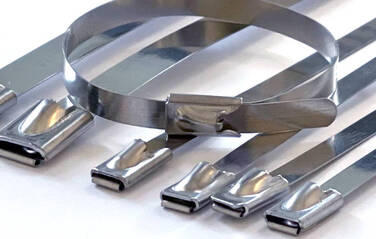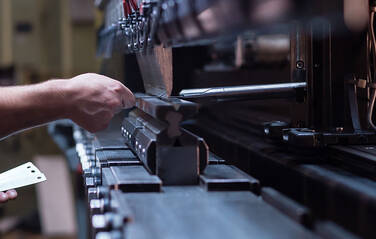Their versatility makes cable ties suitable for use across a wide range of industries. Here we look at which industries use metal cable ties.
Metal cable ties in the automotive industry
The harsh conditions found beneath the bonnet of a vehicle, where there is petrol, oil, and grease require a cable tie that can withstand them. Stainless steel cable ties are the ideal choice here as they offer excellent heat resistance and can withstand the effects of weathering.
Metal cable ties in construction and mining
While these industries use a variety of cable ties, 316 stainless steel cable ties offer features that make them highly desirable; they are resistant to the effects of environmental conditions, chemicals, corrosion and are capable of withstanding excessive temperatures.
Metal cable ties in manufacturing industries
Stainless steel cable ties are generally used to secure goods and components during transit as they prevent damage from vibrations. In the manufacture of equipment that will be exposed to vibrations, metal cable ties can secure parts and safeguard against damage that can be caused to, for example generator components and HVAC thermostats and coils.
Metal cable ties in food manufacturing
Metal detectable cable ties are widely used in food manufacturing where the prevention of product contamination is paramount to the safe and ongoing functioning of the plant. The smallest fragment can be detected by metal detector equipment and X-ray machines, as well as their bright blue colour being easily detectable by eye.
Metal cable ties and scaffolding
In 2015, the HSE (Health & Safety Executive) issued guidelines around the use of cable ties, specifically relating to extendable scaffolding loading bay gates. The HSE guidelines came about to address difficulties arising from loading bay gates that were found not to comply to legal requirements when in certain configurations. In these instances, it was deemed that ‘stainless steel cable ties will be accepted as an interim measure for securing the mesh panel, and should be installed to the gate supplier's instructions. Typically this will be one cable tie per 300mm. Unless the gate manufacturer/supplier allows a lighter duty cable tie, ties rated at minimum 75kg loop tensile strength should be used.’
Benefits of metal cable ties
- Metal cable ties will not perish over time
- Metal cable ties do not dry out
- They do not give off gases which makes them suitable for air handling systems and HVAC
- They offer unparalleled tensile strength – 4.6mm wide stainless steel cable ties have a tensile strength of 89kg and 7.9mm wide ties have a tensile strength of 160kg
- They offer a working temperature range of -80°C - +538°C
Metal cable ties from cableties-online.co.uk
At cableties-online.co.uk we use only the finest marine-grade 316 stainless steel (compared to 304 stainless steel) in the manufacture of our metal cable ties. 316 stainless steel is resistant to pitting and corrosion and has superior heat resistance. We also supply epoxy-coated stainless steel cable ties where protection from scratches and damage is needed, and for any situation where a metal cable tie could make contact with galvanised steel and cause a reaction.
All our stainless steel cable ties are fully compliant with the 18th Edition of the IET Wiring Regulations (BS7671) which came into force on January 1st 2019, giving you the peace of mind that the cable ties you use will be more than up to the job.
If you would like any further information or you have any questions, please contact our friendly team by email at sales@cableties-online.co.uk or by phone on 01623 412160.








